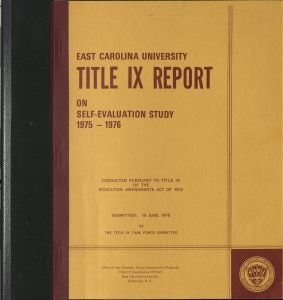Title IX panel recap
Students, staff and faculty attended and engaged in a Title IX panel conversation featuring various campus representatives in, “Uppity Women: The History and Future of Title IX” in the Janice Hardison Faulkner Gallery on Sept. 22.
The panel was led by Academic Library Services, the Gender Studies Program, Office for Equity and Diversity and ECU Athletics. This event also was in conjunction with a Title IX historical exhibit that was curated by University Archives and opened on the first floor of the main campus library. Although part of the evening focused on athletics and the historical challenges faced and changes made to improve opportunities for women in sports, Terrell Nicholson, an ECU equal opportunity and Title IX compliance specialist, discussed how the 1972 legislation still has a widespread impact on campus.

Assistant university archivist Patrick Cash discusses the history of Title IX’s impact at ECU.
“The basis of protection does include equity in athletics, but it also includes protection against discrimination on the basis of sexual harassment, which is inclusive in terms of sexual assaults and the like of other acts of interpersonal violence,” Nicholson said. “We look at things and actions that come to us. These protections are the basis of what I do and many of the colleagues do in our office each day on campus here at ECU. … We want to ensure safety for all.”
University Archives staff members Alston Cobourn and Patrick Cash began by looking specifically at the history on Title IX nationally and at ECU. Nicholson then discussed the role of the ECU Office for Equity and Diversity. ECU Athletics was represented by Alex Keddie, senior athletics athletics director for compliance, and current graduate student-athlete Camryn Pennypacker, a lacrosse player from Mullica Hill, New Jersey, whose message included an importance on mental health resources for all collegiate athletes.
Title IX legislation led to ECU to making significant changes in enrollment policies, student life and housing, academics and athletics that impact both students and employees.
“When you really go and look through all the years, I knew some of those things, but there were a lot of nuances that I wasn’t really aware of,” Cobourn said. “It’s interesting to see how different that is from today.”
One of the earliest significant moments in Title IX history at ECU impacted tuition and financial aid. In the spring of 1974, ECU dropped a longstanding rule that required a married female student to claim the same residency as that of her husband. Previously, married female students could be charged higher tuition prices simply for having married a male classmate who was from outside of North Carolina.

ECU women’s lacrosse player Camryn Pennypacker, third from right in panel, answers a questions from the audience during a Title IX panel conversation held in the Faulkner Gallery on Sept. 22.

Terrell Nicholson, an equal opportunity and Title IX compliance specialist at ECU, talks about his office’s role in Title IX compliance on campus.
Previous post
June 23 marked the 50th anniversary of the signing of Title IX legislation by President Richard Nixon. Part of the Education Amendments of 1972, Title IX prohibits any educational institution that receives federal funding from discriminating based on an individual’s sex. It fills a gap in the Civil Rights Act of 1964, which despite outlawing discrimination based on race, color, religion, sex or national origin, failed to address discrimination based on an individual’s sex for those employed or enrolled at an educational institution.
Nixon assigned the task of implementing the new legislation to the Department of Health, Education and Welfare (HEW). Three years later in June 1975, HEW published
its final regulations and enforcement guidelines for Title IX. Since then, the federal government has consistently published reports on how Title IX legislation should be enforced and interpreted by all.
While most of the early attention around Title IX related to gender equality in athletics, the first real change to ECU policies was related to tuition and financial aid. In the spring of 1974, ECU dropped a longstanding rule that required a married female student to claim the same residency as that of her husband. Prior to this policy change, married female students could be charged higher tuition prices simply for having married a male classmate who was from outside of North Carolina. Other changes included the awarding of athletic scholarships to female students, the changing of student life rules that were discriminatory against females and even the cancellation of the ECU men’s soccer team. A 1978 student grievance brought even more changes as outlined in a “Plan to Strengthen Women’s Athletics and Comply with Title IX Guidelines,” which was approved by Chancellor Thomas Brewer.

